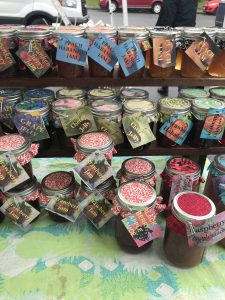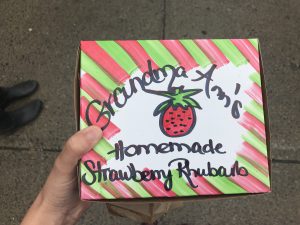By Julia Blass
 For my independent field trip, I went to the Beacon farmers market. Located right off of Main St., this farmers market operated by Common Ground farm operates year-round, and is open every Sunday. The fact that this market operates year-round is somewhat unique, and gives local farmers a consistent place to sell their goods. Despite the weather being rather cold and damp, there were still lots of people out to purchase local products at what I learned was a weekend staple of the town of Beacon. The market seemed to draw locals as well as outsiders like myself, as I saw some people having familiar conversations with vendors and others like myself seeing everything for the first time. As it is still fairly early in the season and many fruits and vegetables are not yet ready for harvest, many of the vendors were bread and pastry sellers, prepared food sellers, or sellers of added-value products such as jams, pickles, and soaps as well as local wool products. There were also some interesting local products I had never heard of before, such as chocolate goat’s milk! I stopped to buy a strawberry rhubarb pie from Wright’s farm stand, an operation based in Gardiner that was selling baked goods and beautifully packaged fruit preserves. I also stopped for a pastry from local Beacon business Bread Alone, who are one of the farmers market’s year-round vendors. The farmers market also seemed to partner with a weekly flea market taking place in the next door lot, which proved to have some interesting finds.
For my independent field trip, I went to the Beacon farmers market. Located right off of Main St., this farmers market operated by Common Ground farm operates year-round, and is open every Sunday. The fact that this market operates year-round is somewhat unique, and gives local farmers a consistent place to sell their goods. Despite the weather being rather cold and damp, there were still lots of people out to purchase local products at what I learned was a weekend staple of the town of Beacon. The market seemed to draw locals as well as outsiders like myself, as I saw some people having familiar conversations with vendors and others like myself seeing everything for the first time. As it is still fairly early in the season and many fruits and vegetables are not yet ready for harvest, many of the vendors were bread and pastry sellers, prepared food sellers, or sellers of added-value products such as jams, pickles, and soaps as well as local wool products. There were also some interesting local products I had never heard of before, such as chocolate goat’s milk! I stopped to buy a strawberry rhubarb pie from Wright’s farm stand, an operation based in Gardiner that was selling baked goods and beautifully packaged fruit preserves. I also stopped for a pastry from local Beacon business Bread Alone, who are one of the farmers market’s year-round vendors. The farmers market also seemed to partner with a weekly flea market taking place in the next door lot, which proved to have some interesting finds.
The Beacon farmers market has some unique qualities that set it apart from other farmers markets that I’ve been to in the past. They have a compost collection stand run by local business Zero to Go, with the goal of making the market a zero-waste event each week. You can bring your compost to the farmers market for drop off, and Zero to Go also provides garbage and recycling bins to accurately sort and dispose of waste responsibly each week. Additionally, the Beacon farmers market allows the use of food benefit programs, which helps make local agricultural products more accessible to a wider demographic, as traditionally local agricultural products are more expensive than their conventional, imported counterparts. Being able to use food benefits such as SNAP, WIC, or FMNP checks is a huge step forward for making locall-sourced nutritious fruits and vegetables available on a wider level. Additionally, people who use these benefits at the farmers market can get bonus coupons to spend at the market. For example, for every $5 spent through SNAP, one would receive an extra $2 Fresh Connect check to use at the market. The Beacon farmers market also has benefits for WIC and FMNP, a unique programs called Greens4Greens. Under this program, every $4 spent through WIC or FMNP awards the user a $4 coupon to buy fresh fruits or vegetables at the market.
The Beacon farmers market struck me as a fine example for other farmers markets around the region to follow. In class we have often talked about how local produce is a difficult business for both the farmers who produce the food to maintain, as the demand for local products is often limited to certain demographics such as high-end restaurants or more upscale farmers markets. The use of food benefits at farmers market is a phenomenon that is just starting out, but the success of the Beacon farmers market is inspiring for the hopeful eventual spread of similar programs across the region and maybe even across the country.
For more information on the farmer’s market, their website is available here .

